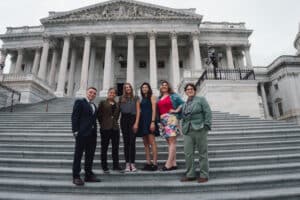November Policy News Round-Up
Happy Holidays! Important legislation was introduced in Congress, the federal government avoided a shutdown, and updated civil rights data for students with disabilities was released by the U.S. Department of Education. Learn more about what NCLD did this month.

New Bills Introduced in Congress
The Counseling Not Criminalization in Schools Act was reintroduced in Congress on November 2nd by Rep. Ayanna Pressley (MA-07), and Sen. Chris Murphy (CT). If passed, this bill would end federal funding for school-based law enforcement and would redirect those funds to counselors, teachers, and positive supports for children in schools. Students with disabilities, as well as students of color, are disproportionately negatively impacted by the presence of school-based law enforcement. By redirecting funds, schools can foster more healthy and supportive environments. The Counseling Not Criminalization Act is one of five bills identified in a suite of school climate legislation endorsed by the Leadership Conference on Civil and Human Rights (LCCHR)- a coalition NCLD participates in actively.
The Advanced Coursework Equity Act was also reintroduced by Sen. Cory Booker (NJ) and Rep. Joaquin Castro (TX-20) on November 14. The bill would expand access and enrollment for underrepresented students, including students with disabilities, in advanced coursework and academic programs by creating a federal grant program to help states and school districts with these efforts. Students with disabilities and other groups, such as students of color and students impacted by poverty, are historically underrepresented in programs such as Advanced Placement (AP) and International Baccalaureate (IB) courses, which this bill seeks to correct. NCLD’s Director of Policy & Advocacy, Lindsay Kubatzky, was quoted in Sen. Booker’s press release announcing the legislation.
Federal Funding Update
The federal government avoided a shutdown in early November when Congress passed a new continuing resolution (CR) with two new expiration dates for funding federal programs, including IDEA. The CR extends the current fiscal year 2024 funding for one handful of appropriations bills until January 19, and another handful of appropriations bills, including the Labor-HHS-Education appropriations bill, until February 2nd. If Congress does not agree on appropriations funding for each program by its deadline, they will either need to pass another CR to further extend the deadline, or federal programs will shut down.
In the House, the Labor, Heath, Human, Services, and Education (LHHS-ED) funding bill for FY24, which proposes a dramatic 28% cut to education funding, was debated on the House floor but was “pulled from the floor” before taking a final vote for passage because there wasn’t sufficient support for it. This bill’s failing is a win, signaling that deep funding cuts to education and other programs like healthcare do not have broad support.
Civil Rights Data Collection (CRDC) for the 2020-20221 School Year is Released
The U.S. Department of Education released the long-awaited Civil Rights Data Collection (CRDC) for the 2020-2021 school year on November 15. The CRDC is an expansive and essential dataset collected by USED’s Office of Civil Rights (OCR) that is mandatory for all public schools and school districts, and provides information about student access to educational programs, activities, staff, and school climate factors such as school discipline. The dataset includes information disaggregated by numerous factors, including student disability status, making it an invaluable tool for OCR and other advocates to assess and identify gaps in educational opportunities among student groups. Prior to the release of this data, the most recent CRDC dataset reflected the 2017-2018 school year. Many advocates are also interested in how the COVID-19 pandemic will impact the data, and what can be learned about the student experience during the pandemic.
USED provided a handful of resources with initial findings from the 202-2021 CRDC, including a “first look” that can be found here. NCLD is also working on an analysis of the data to highlight findings that are particularly relevant for our community, to be released in the coming weeks.
In Case You Missed It
- NCLD held its annual benefit, “Exceptional Things Continue to Happen,” on November 9 in New York City! The event honored our scholarship and Everyday Champion Award winners and was emceed by Star Jones.
- Visit the NCLD Action Center to participate in our current advocacy campaigns, and contact your representatives!
